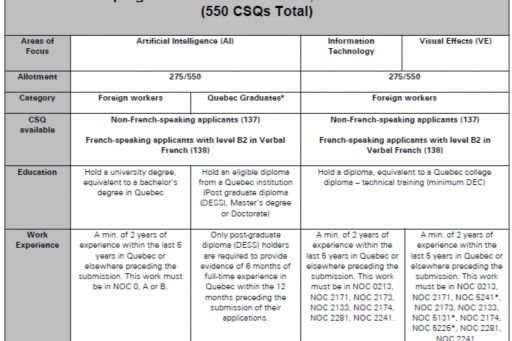Canada – New Immigration Pilot Programs Introduced in Quebec
Canada–New Immigration Pilot Progs Introduced in Quebec
Quebec’s immigration authorities announced on October 28 three pilot programs will be implemented to provide more ways to permanent residence in Quebec for certain temporary foreign workers already living in Quebec or with previous experience abroad. Other changes include the re-opening of both the Entrepreneur and Self-Employed Worker streams as of November 1, 2020.

On October 28, 2020, Quebec’s Minister of Immigration, Francization and Integration (MIFI) announced three pilot programs will be implemented to provide further pathways to permanent residence in Quebec. These pilot programs will benefit certain temporary foreign workers already living in Quebec or with previous experience abroad.1 Other changes include the re-opening of both the Entrepreneur and Self-Employed Worker streams as of November 1, 2020.
Those who are not eligible for the pilot programs can continue to submit their applications for the regular Quebec Skilled Worker Program via the online platform, ARRIMA, along with the Quebec Experience Category, as they remain unchanged.2
WHY THIS MATTERS
The current economic crisis caused by COVID-19 has severely impacted various industries, particularly those related to the health, food and technology sectors. The government of Quebec is taking significant action to support individuals and businesses facing hardship as a result of the pandemic. These new pilot programs have been prepared to respond to the acute needs faced by the province and will help to attract and retain employees.
New Pilot Programs for Permanent Residence
The programs will be in place for an anticipated duration of five years. Further details will be disclosed during official public consultations, currently ongoing until December 12, 2020.
Each pilot will benefit from a maximum allotment of 550 Quebec Selection Certificates (CSQ) per year. The focus will be on attracting and retaining: nurse’s aides and patient attendants, workers in the food processing industry, as well as key global talent distributed equally between the artificial intelligence (AI), information technology (IT) and visual effects (VE) sectors. The pilot program aimed at the AI, IT and VE sectors is summarized in the table below.

Entrepreneur and Self-Employed Worker Programs
The Quebec Entrepreneur Program will re-open over the course of the next year. This program is directed at those who are willing to create and manage a business in the province. To qualify and obtain a CSQ via this program, they will need to be supported by a service offered by either a business accelerator or incubator, or a university entrepreneurship centre in Quebec. Therefore, until further notice, Quebec is excluding those applicants who would otherwise have the intention of acquiring a business by investing in or taking majority ownership of an existing business. This decision is intended to help promote the province’s IT and AI eco-systems, to compete with one of the world’s largest concentrations of academic research in the industry. The MIFI will accept up to 25 applicants who are not able to satisfy the French language requirements.
The Quebec Self-Employed Program will benefit individuals intending to practice their profession or business activities, alone or with support. To qualify, candidates will need to provide evidence of at least two years of self-employed work experience abroad in the same profession they plan to practice in Quebec. They will also need to prove they have C$100,000 in net assets. The MIFI will accept up to 50 applicants who are not able to satisfy the French language requirements.
* Entrepreneurs and self-employed individuals with an approved language test showing their French language proficiency would be exempt from this intake threshold under each program and be able to apply at any time.
KPMG NOTE
Impact on Employers and Employees
These new pilot programs will help to attract and retain employees in the AI, life sciences, health technology, VE and animation industries. In addition, contrary to Quebec Experience Program (PEQ), there is no French-language-proficiency requirement for accompanying spouses or common-law partners under the new pilot programs. Further information regarding each pilot program’s processes and selection criteria will be shared throughout the current ongoing public consultations.
Note that special attention should be given to IT workers, currently employed or who have accepted an employment under NOC 5241, Graphic designers and illustrators, and whose expertise is related to product content or digital marketing creation. To qualify under the new pilot programs, they would need to be employed in the VE sector.
Additional efforts may be needed to meet the required hourly wage, which may be challenging for some businesses in the present economic circumstances. This is particularly relevant for IT and VE workers for companies who would not be able to offer the hourly wage exceeding the 9th decile of the Quebec median wage established back to 2017 for some occupations.3 (Ex. NOC 0213, Computer and Information Systems Managers, requires an annual salary of C$155,563.20 based on a 40-hour week (subject to change)).
Lastly, entrepreneurs may benefit greatly from the announced program. It will help to create the necessary foundation to establish status in Quebec as they continue to build their enterprises with the collaboration of local accelerators, incubators, or academic research centres. Although limited in number, entrepreneurs who are not fluent in French will have a new path to securing permanent residency in Quebec. This is encouraging news that supports job creation and innovation for the province.
We Are Monitoring the Situation
Should you have any questions, please do not hesitate to contact your qualified immigration professional or a member of the KPMG Law LLP (Canada) team (see the Contact Us section).
We will continue to monitor the implementation of all upcoming Quebec immigration programs and provide you with insight and strategies as they become available.
FOOTNOTES
Francization and Integration (Ministère de l’Immigration, de la Francisation et de l’Intégration or “MIFI”), website, see: http://www.mifi.gouv.qc.ca/fr/presse/communiques/com20201028.html.
2 For “Arrêté numéro 2020-005 de la ministre de l’Immigration, de la Francisation et de l’Intégration en date du 16 octobre 2020” in the October 28 Gazette Officielle du Québec (in French), see: http://www2.publicationsduquebec.gouv.qc.ca/dynamicSearch/telecharge.php?type=1&file=73431.pdf .
3 For the Guide des Salaries Selon Les Professions au Québec, Edition 2017 (in French), see: https://www.emploiquebec.gouv.qc.ca/uploads/tx_fceqpubform/00_imt_guide-salaires-professions_2017.pdf.
VIEW ALL
* Please note the KPMG International member firm in the United States does not provide immigration or labour law services. However, KPMG Law LLP in Canada can assist clients with U.S. immigration matters.
The information contained in this newsletter was submitted by the KPMG International member firm in Canada.
SUBSCRIBE
To subscribe to GMS Flash Alert, fill out the subscription form.
© 2024 KPMG LLP, a Canada limited liability partnership and a member firm of the KPMG network of independent member firms affiliated with KPMG International, a Swiss entity. All rights reserved.
KPMG International Cooperative (“KPMG International”) is a Swiss entity. Member firms of the KPMG network of independent firms are affiliated with KPMG International. KPMG International provides no client services. No member firm has any authority to obligate or bind KPMG International or any other member firm vis-à-vis third parties, nor does KPMG International have any such authority to obligate or bind any member firm.
GMS Flash Alert is a Global Mobility Services publication of the KPMG LLP Washington National Tax practice. The KPMG name and logo are trademarks used under license by the independent member firms of the KPMG global organization. KPMG International Limited is a private English company limited by guarantee and does not provide services to clients. No member firm has any authority to obligate or bind KPMG International or any other member firm vis-à-vis third parties, nor does KPMG International have any such authority to obligate or bind any member firm. The information contained herein is of a general nature and is not intended to address the circumstances of any particular individual or entity. Although we endeavor to provide accurate and timely information, there can be no guarantee that such information is accurate as of the date it is received or that it will continue to be accurate in the future. No one should act on such information without appropriate professional advice after a thorough examination of the particular situation.
